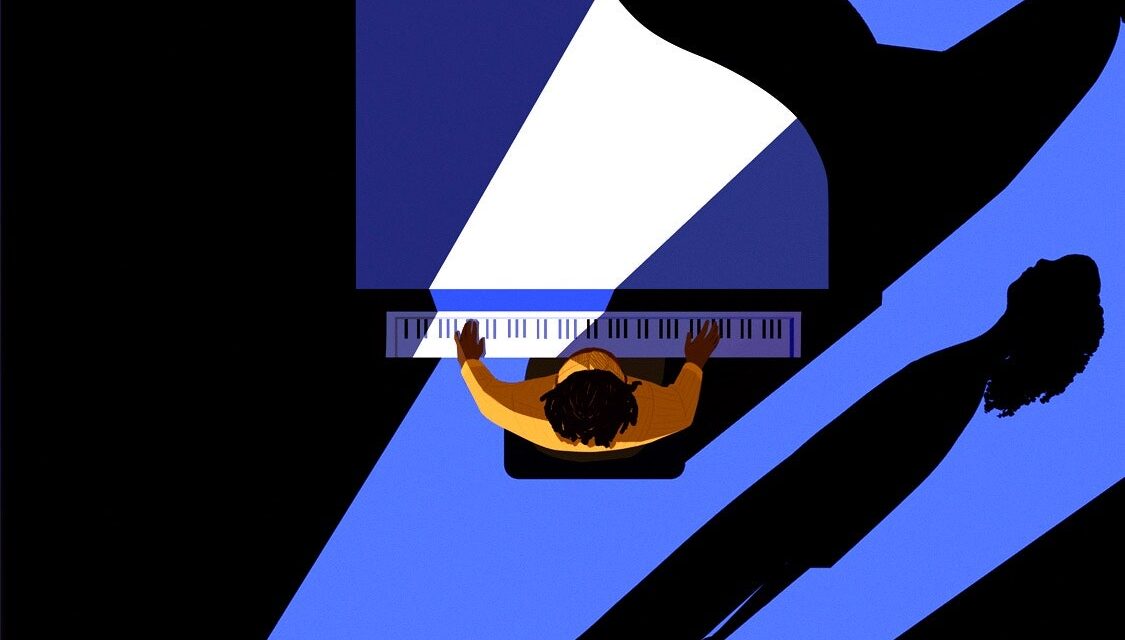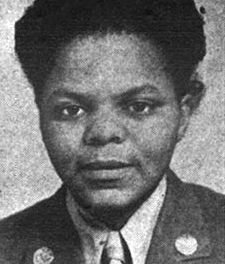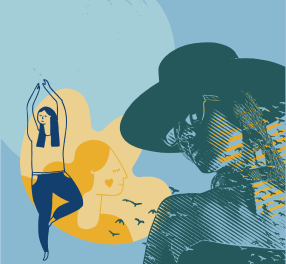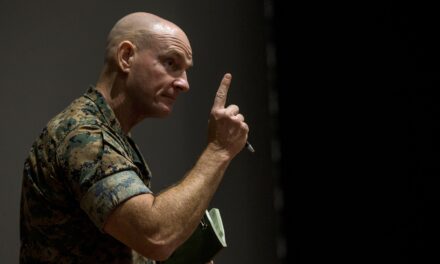“Hell’s Kitchen” Brings Alicia Keys’s Musical Power to the Public

Writing a biographical musical is tricky. Where do you begin and end? Lives often don’t follow a dramatic arc, and bending events into the right curve might damage them. Writing an autobiographical musical is trickier still. If you’re notable enough to be writing one, it can be awkward to mention all your achievements. Surely you don’t need to explain yourself?
Alicia Keys—global megastar and winner of fifteen Grammy Awards, including three for Best R. & B. Album—neatly sidesteps these issues with the frequently exhilarating (and occasionally repetitive) “Hell’s Kitchen,” now at the Public. First, she and her book writer, Kristoffer Diaz, limit their focus to a few months in the life of a musically gifted seventeen-year-old in New York. (Those words should instantly cue Keys’s billowing hook from “Empire State of Mind” somewhere in your limbic system.) Their heroine, the young Ali (Maleah Joi Moon), is having both a sexual and an artistic awakening, all while rebelling against her protective single mother, Jersey (Shoshana Bean), who just wants to keep her safe in their apartment high above the Hudson. Ali pictures herself as a kind of Rapunzel in Timberland boots. “It’s just me, locked away in this tower, cut off from this city,” she cries, as the band’s accompaniment swells. “Fuck right I’m angry.”
The show draws mostly from Keys’s catalogue, beginning with deep-ish cuts (the delicate waltz “Gramercy Park,” from her 2020 album, “Alicia”) and a few new songs, unleashing the famous numbers (“Girl on Fire,” delivered at siren strength) only when a certain dramaturgical flow has been established. Exactly how autobiographical is “Hell’s Kitchen”? The answer is elusive. There are certainly parallels between creator and character: both Alicia and Ali have absent fathers; both fall for an older man; both are drawn, inexorably, to the piano. And both grow up in the nineteen-nineties, in Manhattan Plaza, a huge development of subsidized artists’ housing, west of Times Square. In the production’s loveliest, lightest touch, Ali, while taking the elevator to her apartment, on the forty-second floor, listens to the sounds of her building every time the doors open—merengue on twenty-seven, jazz trumpet on thirty-two. When Keys was seventeen, though, she wasn’t learning chords. She had long been an acknowledged prodigy, and was already fighting with Columbia Records over what would be her first album, “Songs in A Minor.” She had also been living independently for about a year.
So “Hell’s Kitchen” plays as a Keys-inflected fable, which the director, Michael Greif, stages using billboard-y projections by Peter Nigrini. (You sometimes feel you’re being pitched on a Hell’s Kitchen Real-Estate Opportunity.) A large ensemble, choreographed by Camille A. Brown, moves propulsively around Robert Brill’s gloomy set of sliding black cubes. Here are the late nineties in all their badass, cargo-pant splendor: jeans that refuse to flatter—the costume designer, Dede Ayite, finds one particularly terrifying high-yoke cut—and best-forgotten dance moves, like the Running Man. The dancers turn up at the oddest times, though, even when characters are seducing each other, or attending a funeral. You apparently cannot have a private moment in New York without a dance crew butting in to do interpretive work.
There’s no villain, as such, but Ali’s bucket-drummer Romeo, Knuck (Chris Lee), so panics Jersey that she asks her friends, including a bunch of cops, to keep Knuck away from her daughter. This, of course, triggers a brutal encounter. A virtuoso pianist who lives in the building, Miss Liza Jane (Kecia Lewis), begins to teach Ali how to play, and, while the musical hasn’t worked out just how to handle this character—Jersey, for opaque reasons, resents her—Lewis builds an entire architecture out of pitch alone. She closes the first act with a dirge about violence against young Black men, “Perfect Way to Die,” plunging down a vocal register, and then, impossibly, down again. Her voice, excruciatingly beautiful, seems to be digging a grave.
Indeed, the show’s vocal casting makes shades of meaning where Diaz’s script doesn’t always succeed. Moon’s soaring, youthful tone has a gorgeous rasping burr to it, while Bean’s astonishing sledgehammer voice has a similar, fractured quality. The mother-daughter relationship is contained in their two approaches to that rough-sawn sound—one takes it easy, the other wields her stress like an audible weapon. We also learn everything we need to know about Ali’s undedicated father, Davis (Brandon Victor Dixon), from the way his smoky voice drifts across the stage. At one point, he lets his timbre go particularly seductive, while swirling a glass of amber liquid at Jersey’s dinner table. “It’s just iced tea!” Bean tuts at him, hilariously. No matter where this guy goes, the club comes along.
The first act—yearning, wooing, discovery, betrayal—is a marvellous match for Keys’s neo-soul romanticism, while the second act, where we spend an hour on Ali’s rapprochement with her mother, can grow wearing. But it’s hard to begrudge the pivot in attention from child to mom. In her memoir, “More Myself,” Keys writes about a young romance, begun with a twenty-four-year-old when she was only fourteen. No wonder she wants to rewrite those days, to shift the ages around a bit, and to imagine a life lived a little longer under a parent’s care. The rebellion we hear in those early scenes of Ali’s—“Fuck right I’m angry”—seems slightly overblown coming from a girl of seventeen, sulky at having to eat her mother’s cooking every night. But perhaps that rage is older than she is.
I can’t quite figure out the calculations behind “The Gardens of Anuncia,” at Lincoln Center, though many of them are similar to those in “Hell’s Kitchen”: “Gardens” is also a (loosely) biographical musical based on a talented woman’s childhood, in this case the Argentinean-born director and choreographer Graciela Daniele. Written by her friend and frequent collaborator the composer Michael John LaChiusa, it, too, trains its attention on the women raising a girl after a father has left; it, too, lets us see how self-centered a gifted teen can be. Here, Anuncia (Kalyn West, playing the young version of the Daniele avatar) pirouettes in oblivious delight even as a supergroup made up of grandmother (Mary Testa), mother (Eden Espinosa), and aunt (Andréa Burns) works to support her dreams under the shadow of the Peróns.
Few people will go into “Hell’s Kitchen” unfamiliar with Alicia Keys, but Daniele may need some introduction, which this oddly hermetic show refuses to provide. During the musical, only glancing attention is paid to her artistry, and we don’t learn much about her long history both on and off Broadway. (She got a Special Tony Award for Lifetime Achievement in 2020.) Yet the production, directed by Daniele herself, isn’t willing to stay in the past, either. Instead, there are laborious scenes set in the present day, when Priscilla Lopez, playing an older version of Anuncia, wanders around her garden, chatting with a flirtatious deer and rhapsodizing over her memories. As the deer says, while exiting, “Weird.”
LaChiusa has referred to the project as an “act of gratitude for those women who created one of the most incredible women in my life.” And it did feel as though I had intruded on a private communication, one not meant to be shared more widely. In its way, even the musically explosive “Hell’s Kitchen,” with its careful elisions, felt private, too. Both shows point to a vulnerability inherent in biographical projects. We go to them hoping that we’ll learn how someone extraordinary became herself—how a girl in Manhattan Plaza became an R. & B. titan, or how a ballerina in Buenos Aires got out. But, in “Anuncia” and “Kitchen,” women with precocious success look back at their driven childhoods and edit out their grind and ambition in favor of a warm appreciation for their caretakers. No wonder there’s a certain cipher-like quality to these musicals. Both are love letters to mothers, but there’s a blurriness at the center where the daughters should be. ♦





